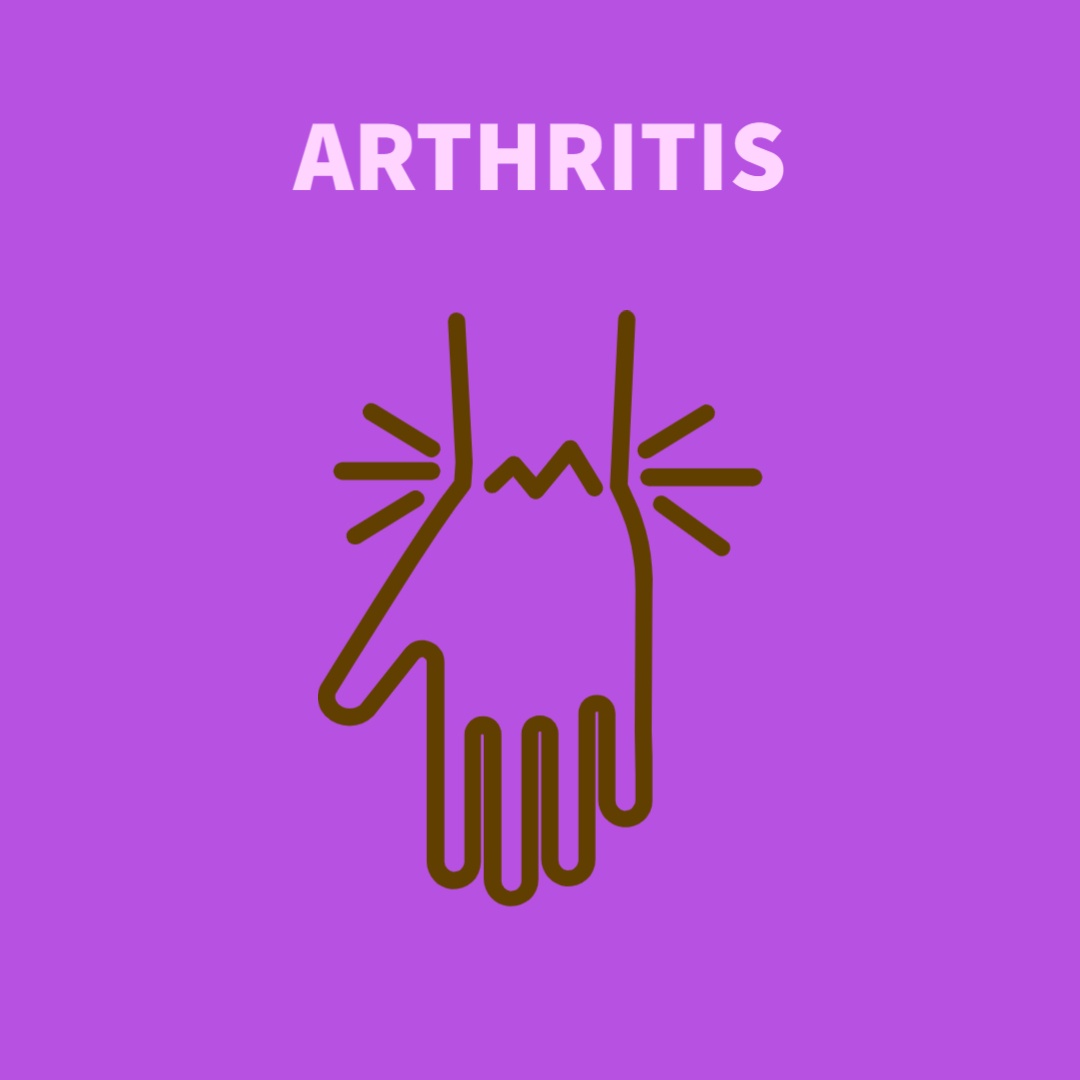Arthritis
Arthritis, having different causes, is the term used for several disease conditions involving inflamed, painful degenerative joints.
Types of Arthritis
1- Rheumatiod Arthritis (RA); Rheumatoid Arthritisis an Autoimmune Disease and involves chronic inflammation of the Synovial Membranes of the Joints in the fingers, wrists, feet, ankles and often the hips and shoulders causing destruction of Cartilage, Bone and other adjacent Tissues and causing pain, stiffness, swelling, and loss of function in the joints.
substance may prevent or Alleviate Rheumatoid Arthritis (RA)
1- Amino Acids (Cysteine, Glycine, Histedine)
2- Glucosamine may alleviate Rheumatoid Arthritis.
3- Enzyme may minimize the Pain and Inflammation associated with Rheumatoid Arthritis (Bromelain, Proteases, Chmotrypsin, Trypsin and Pancreatic enzymes)
4- Hormone should be check (blood test) prier to take any hormone
– Optimal Testosterone levels may protect against the development of Rheumatoid Arthritis in males – this theory is based on the finding that male Rheumatoid Arthritis patients generally exhibit low endogenous DHEA levels
– Pregnenolone may be effective against Rheumatoid Arthritis during the early stages of the disease
– Rheumatoid Arthritis patients generally exhibit low endogenous DHEA levels
5- Lipids
– Beta-Sitosterol may help to control Rheumatoid Arthritis (by stimulating the proliferation of TH1 Helper T-Cells and deactivating TH2 Helper T-Cells)
– Omega-3 Fatty Acid
– Alpha-Linolenic Acid (LNA) may alleviate the Pain and Inflammation associated with Rheumatoid Arthritis
– Eicosapentaenoic Acid (EPA) may retard the further progression of Rheumatoid Arthritis
– Prostaglandin E1 (PGE1)
6- Vitamins
– Vitamin A
– Zinc and Selenium may alleviate the symptoms of Rheumatoid Arthritis
– Vitamin B12
– Vitamin B3 (Niacinamide)
– Vitamin B6
– Vitamin E
– Vitamin C
– Vitamin K
2- Osteoarthritis; OsteoArthritisis the most common type of Arthritis. It is characterized by the degeneration, destruction and erosion of the Cartilage in the Joints and bony outgrowths at the edges of the Joints. Articular surfaces become irregular, flattened and poorly adjusted to each other. This causes the Joint Cavity between adjacent Bones to gradually narrow. Eventually Bones may directly scrape against one another. OsteoArthritisis more prevalent in weight-bearing Joints such as those of the knees, hip, ankles, elbows, wrists, spine, and shoulder.
3- Gout; Gout effects over 3.5 million people a year in the US alone. Considered a form of Arthritis where excess Uric Acid is present in the blood causing accumulation, deposition, of uric acid crystals (monosodium urate) around joint tissue, primarily effecting the big toe. Feet, ankles, knees and hands can also be effected by gout. Acute gout occurs when the area effected is red, feels hot, swollen with excruciating pain lasting days to weeks.
A genetic defect in the body’s metabolism of Purines known as the Lesch-Hyhan syndrome may cause increased endogenous production of Purines leading to excessive concentrations of Uric Acid. Approximately 70% of gout patients have an overproduction of Uric Acid, the remaining 30% of gout patients have defective elimination of uric acid.
4- Psoriatic Arthritis; Psoriatic Arthritisis a type of Arthritisthat occurs in Psoriasis patients.
Psoriasis is a type of chronic Skin disease in which itchy scaly red patches form on the elbows, forearms, knees, legs or Scalp. It is characterized by thickening of the Epidermis which reveals bleeding points upon removal of the scale. The underlying cause of Psoriasis is uncontrolled Cell growth. Normally, Keratinocytes (a type of Skin Cell) have a life cycle of 28 days. Fourteen of those days are usually required for the Keratinocyte to fully develop and move from the lower layer of the Skin to the outermost layer. During the remaining fourteen days the Keratinocyte dies and is sloughed off. During Psoriasis, Keratinocytes have a significantly accelerated life cycle, migrating to the surface in only four days. Psoriasis is regarded as an (organ-specific) Autoimmune Disease.
Treatment
Treatment mainly focuses on reducing pain and improving movement. Medication for arthritis includes pain relievers and anti-inflammatory tablets. For the treatment of rheumatoid arthritis, corticosteroids or disease modifying anti-rheumatic drugs (DMRD’s) may be prescribed, which will suppress the immune system.
Nutrition
To decrease or alleviate Arthritis pain have a healthy diet and anti inflammatory diet, that includes fruits and vegetables, essential fatty acid (omega-3 and omega6-).
– Fish
– olive oil
– Walnuts
– Ginger
– Tart Cherry juice
– Berries
-Broccoli
– Spinach
– Grapes (diabetic patient should consume less)
Other Nutrients
– Amino acid (Cystine, Glycine, Histidine)
– Glucosamine
– Bromelain
– Papain
– Boron
– SOD (superoxide Dismutase)
Check your Hormones with your physician.
a -testosterone
b- DHEA
c- Pregnenolone
– Omega-3 Fatty acid
– Linoleic acid
– Alpha-Linolenic Acid
– Probiotic (acid resistance)
– Manganese
– Selenium
– Zinc
– Anti inflammatory (Polyphenols)
– Curcumin
– Quercetin
– Resveratrol
- Insulin Resistance - March 10, 2021
- prostate – Enlarged (BPH) - November 25, 2020
- Probiotics - October 31, 2020


